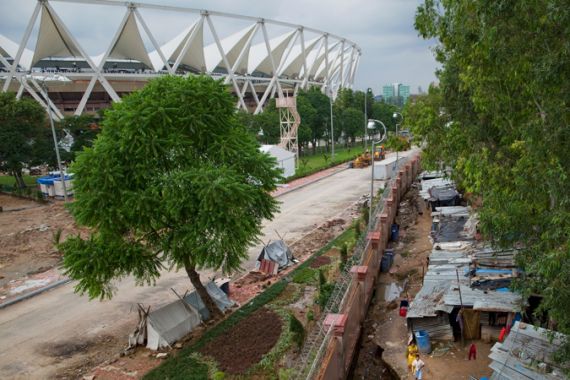Setbacks plague New Delhi Games
From gunfire attacks to dengue fever outbreak, New Delhi has seen it all in the run up to the Commonwealth Games 2010.

 |
| Games venues in New Delhi have been hit by monsoon rains, structural collapses and missed deadlines [GALLO/GETTY] |
The clock is ticking as India pushes to finish preparations to host the Commonwealth 2010 games in New Delhi. Two collapses in two days have fuelled concerns over safety and security of 7, 500 participating athletes.
First it was the footbridge by the main stadium that caved in, injuring 27 workers and then part of the false ceiling in the weightlifting venue collapsed, adding to the woes of the organisers who are already lagging behind in completion of sporting and accommodation venues.
Dropping out
Some high profile athletes including England’s Phillips Idowu, world triple jump champion, and Dani Samuels of Australia, world discus champion have decided to withdraw from the games, citing security and health concerns. Usain Bolt of Jamaica, Triple Olympic sprint champion is the highest profile athlete to miss the games.
And then there are entire teams that have either delayed their departure to New Delhi or threatened to stay back home altogether unless the organisers get their act together to provide safe and clean facilities.
Wales have given organisers until later on Wednesday to guarantee that the venues and athletes’
village are safe while Team Scotland, in a statement, said: “Officials found that building works had fallen seriously behind schedule and that its allocated accommodation blocks were far from finished and in their view, unsafe and unfit for human habitation.”
Teams’ detour
Most teams are scheduled to arrive in the next few days for the October 3 start. But the ones who have already departed, have gone elsewhere but New Delhi.
New Zealand’s swimming team left for Abu Dhabi, as an an official indicated they could participate in another competition, should the Games get cancelled.
Australian and Canadian squads are in Singapore and the British in Doha, suggesting an Asian meet could be quickly organised as a fall back option, should the need arise.
New Zealand Prime Minister John Key told reporters that if “the Commonwealth Games didn’t go ahead, that could have significant implications for the future of the Commonwealth Games, and that’s not something we would like to see.”
Crisis talks
Michael Fennell, Commonwealth Games Federation president will arrive on Thursday for a probable meeting with Prime Minister Manmohan Singh, amid concerns of the two-week event suffering from filthy conditions.
Although the Indian Prime Minister took responsibility of overseeing the Games’ preparations a month ago amid reports of missed deadlines, no action was taken by his office. But now Indian government officials have recognised how it has all become a political issue and after touring the facilities have
said that: “The prime minister is of course extremely concerned.”
The government and the organisers of the games have been at the receiving end of criticism from both home and abroad as the Indians blame their leaders for having failed to deliver despite having funds as well as skilled labour at their disposal. The country’s ability to effectively manage development of $1.5 trillion worth of infrastructure to manage its fast economic growth and even faster growing population, is also being questioned.
Missed opportunity
This was India’s opportunity to spend the $6bn Games budget on developing infrastructure and facilities to show the rest of the world that it is an important player in the global economy, and that it has what it takes to host world class event just like China did when it hosted the 2008 Olympics.
It is not just cries of corruption, collapses and chaos that have marred the games but also reports that the athletes village is unfinished and the surrounding conditions are not welcoming either. Stray dogs, human feces, and homeless people living outside the main stadium, are some of the problems that have elevated health and hygiene concerns.
Indian standards v International standards
Lalit Bhanot, a spokesman for the Delhi organising committee asked people to understand athletes’ concerns. “They want certain standards of hygiene, they want certain standards of cleanliness, which may differ from my standard,” he said.
Dengue fever has already spread in New Delhi. The stagnant water in the city provides perfect breeding conditions for dengue mosquitoes, and thousands of people are being treated for the epidemic in hospitals. Others are fleeing Delhi during the Games, worried about security and traffic chaos.
And if all the structural collapses, disease breakout and unfinished facilities were not enough to put a damper on the games, there have been reports of security lapses as well. Following a gunfire in New Delhi that injured two tourists, Australian TV showed a reporter who bought bomb-making devices and smuggled through security points. Indian police denied he ever crossed a checkpoint.
Show must go on
However Indian government officials remain optimistic attributing the problems, including the roof collapse to mostly minor glitches and insisting that the Games will be a success. Officials also take confidence from a similar occurrence when problems hit preparations of Athens 2004 Olympics. Yet the event went ahead successfully.